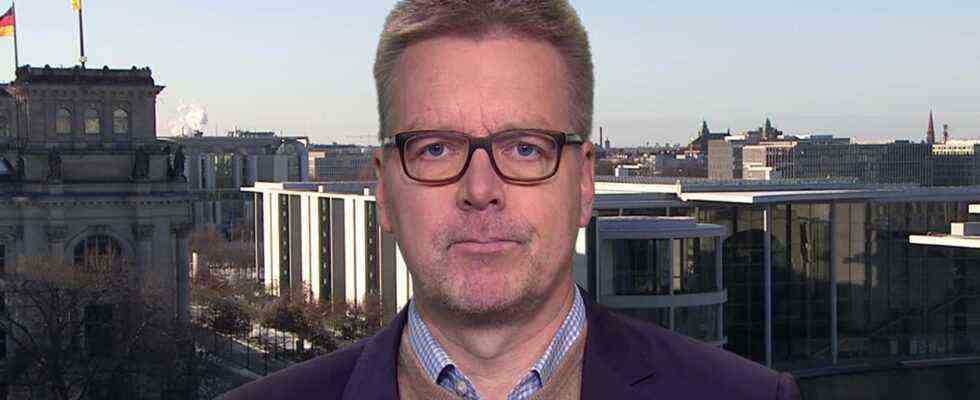interview
Status: 01/21/2022 5:21 p.m
The US and Russian foreign ministers ended their meeting without a result. Both would have exchanged only maximum demands anyway, said the security expert Kaim im tagesschau24-Interview. Both powers are a long way from a consensus.
tagesschau24: Mr. Kaim, US Secretary of State Antony Blinken made it clear after his talks with Russia’s chief diplomat Sergei Lavrov that it was up to Russia whether to proceed with diplomacy or with unpleasant consequences. Was that more of a cautious approach today or sticking to known positions?
Markus Kaim: After all that has become known, I would name the second. The known positions of both the Russian side and the Americans have been exchanged again – without much rapprochement. That the meeting ended earlier than expected illustrates the point that the common ground for compromise is not ready at the moment.
Blinken ultimately delivered the double message that he emphasized yesterday in Berlin. First, Russia faces dire consequences if it engages in military aggression against Ukraine. Second: There is a united front of the West. Lavrov has reiterated Russia’s position on security guarantees, to which he wants the West to respond. These are positions of the last days and weeks. I can only see a little movement.
To person
Markus Kaim is Senior Fellow in the research group “Security Policy” of the Foundation for Science and Politics in Berlin.
tagesschau24: How did you experience Lavrov and Blinken at their separate press conferences? What can you read between the lines?
Kaim: This has been going on for a few weeks and months. As soon as Russian and American officials meet, there will no longer be a joint press conference. This illustrates the state of US-Russian relations. The presidents of both countries regard the status quo in Europe as fragile.
But they don’t see each other as mutual partners in shaping Europe. This applies to Ukraine in the narrowest sense. One could stretch the arc even further to other conflicts where American and Russian politics clash diametrically. That is Syria, Libya and, more recently, Mali. These differences are also reflected in the tonality and in the external form,
tagesschau24: Lavrov spoke clearly of campaigns and lies on the part of the West. How is a constructive solution to the problem possible at all?
Kaim: No solution has been found for the feared military escalation on the Ukrainian-Russian border. There is also no evidence that what the Federal Foreign Minister focused on yesterday, that the Normandy format must meet again and stimulate the negotiation process again. And on the issue of security guarantees for Russia, Blinken showed no concessions.
What is possible, given this blockade, are confidence- and security-building measures – that is, disarmament, arms control and transparency measures. This does not mean that the West and Russia will both become partners now. But both sides have expressed an interest in making progress on these issues
tagesschau24: Did either of them make any concessions?
Kaim: I can’t see that. The maximum position of the last few weeks has been emphasized again. Reviewing Foreign Minister Lavrov’s ultimatum, that he would insist on a US-NATO response, illustrates that there is little consensus between the parties on these key issues at the moment.
tagesschau24: Will this diplomatic path lead to a solution to the Ukraine conflict? As long as they talk don’t they shoot?
Kaim: The conflict between Ukraine and Russia is just one of many. One could add others from the post-Soviet space, such as the Russian military presence in Georgia. Unfortunately, the approaches to the European security order that we have had since 1990 are currently being questioned by the Russian government and are no longer shared.
Apart from the conflict over Ukraine, this gives rise to fears of the worse. Ultimately, one has to state that Russia is returning to a policy known as geopolitics. Arguing takes place in spheres of influence, areas of interest and traditional claims. As long as that is the case, I see little consensus between the West and Russia.
tagesschau24: Russian President Vladimir Putin spread the story that Russia had been politically and militarily betrayed by NATO. Is there any truth behind it?
Kaim: Ever since Putin’s presidency in 2000, we’ve heard these accusations that the East has been encircled. A look at the map shows that NATO cannot encircle Russia at all. Geographically, it is the largest country on earth. In the end, NATO kept its promise to Russia that it would only rotate its military presence and not station permanent troops in Central and Eastern Europe. The fact that many countries – such as Sweden or Finland – are turning more and more towards NATO at the moment illustrates that the threat is perceived more from the East.

